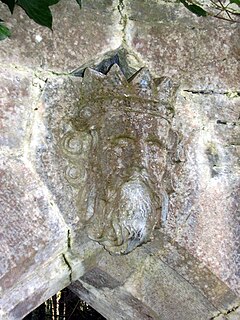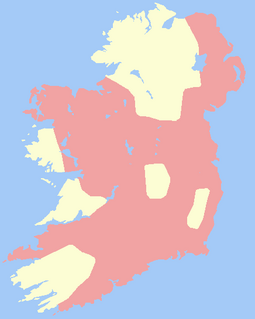
Ruaidrí mac Tairrdelbach Ua Conchobair was King of Connacht from 1156 to 1186, and High King of Ireland from 1166 to 1193. He was the last High King of Ireland before the Anglo-Normans invaded Ireland. (Brian Ua Néill and Edward Bruce both claimed the title with opposition in later years their claims were considered illegitimate.

O'Flaherty, is an Irish Gaelic clan based most prominently in what is today County Galway. The clan name originated in the 10th century as a derivative of its founder Flaithbheartach mac Eimhin. They descend in the paternal line from the Connachta's Uí Briúin Seóla. They were originally kings of Maigh Seóla and Muintir Murchada and as members of the Uí Briúin were kinsmen of the Ó Conchubhair and Mac Diarmada amongst others. After their king Cathal mac Tigernán lost out to Áed in Gai Bernaig in the 11th century, the family were pushed further west to Iar Connacht, a territory associated with Connemara today. They continued to rule this land until the 16th century.
Cathal Crobhdearg Ua Conchobair (1153–1224), the youngest son of the Irish High King Tairrdelbach mac Ruaidri Ua Conchobair, was a King of Connacht.
Felim McHugh O'Connor was king of Connacht in Ireland from January 1310 to 10 August 1316.

Felim O'Connor was king of Connacht in Ireland, having been proclaimed king by William Óg de Burgh in 1230, he reigned from 1233–65. Felim died in 1265 and was buried in the Dominican Priory in Roscommon which he founded in 1253. He was succeeded by his eldest son Hugh McFelim O'Connor.
Hugh McFelim O'Connor, also known as Aodh na nGall, was king of Connacht from 1265 to his death on 3 May 1274. He is credited with turning the tide on Norman expansion into Connacht.
Ruaidri mac Tairdelbach Ua Conchobair, King of Connacht, died 1384.

The Bruce campaign was a three-year military campaign in Ireland by Edward Bruce, brother of the Scottish king Robert the Bruce. It lasted from his landing at Larne in 1315 to his defeat and death in 1318 at the Battle of Faughart in County Louth. It was part of the First War of Scottish Independence and the conflict between the Irish and the Anglo-Normans.
Events from the year 1235 in Ireland.
Brian mac Néill Ruaidh Ó Néill, also known as Brian O'Neill, was the High King of Ireland from 1258 to 1260. His status as High King is disputed by some, as the forces of the O'Briens of Thomond failed to support him in the Battle of Druim Dearg in 1260, which contributed to him being killed. However, they had both submitted by treaty to him and given hostages to him prior to that.

Aodh, , ; is an Irish and Scottish Gaelic male given name, originally meaning "fire". Feminine forms of the name include Aodhnait and Aodhamair. It appears in even more variants as a surname. As a surname, the root or a variant may be prefixed by O, Ó, or Ui, Mac or Mc, or Nic.
The Battle of Connor was fought on 10 September 1315, in the townland of Tannybrake just over a mile north of what is now the modern village of Connor, County Antrim. It was part of the Bruce campaign in Ireland.
Owen Ó hEidhin was King of Uí Fiachrach Aidhne.
Mor Ní Briain was Queen of Connacht, and died 1218. She was a daughter of King Domnall Mór Ua Briain of Thomond. Domnall's wife was Órlaith Ní Murchadha, Princess of Leinster, daughter of Queen Mor Ui Thuathail and King Diarmaid Mac Murchadha of Leinster.
Ulick Fionn Burke, 6th lord of Clanricarde was an Irish warlord.
Flann Ó Tighearnaigh (IPA:[ˈfˠl̪ˠaːn̪ˠoːˈtʲɪjəɾˠn̪ˠiː]), Gaelic-Irish Lord, died 1273.
Dolan is a surname of Irish origin.
Macraith Mág Tighearnán was chief of the McKiernan Clan and Baron or Lord of Tullyhunco barony, County Cavan from c.1240 until his death in 1258.
Féilim is an Irish language name for men, which means "beauty, ever good, constant." The name is derived from the older version Feidlimid, it has been anglicised as Phelim, Feilmy or even Felix.
This page is based on this
Wikipedia article Text is available under the
CC BY-SA 4.0 license; additional terms may apply.
Images, videos and audio are available under their respective licenses.




